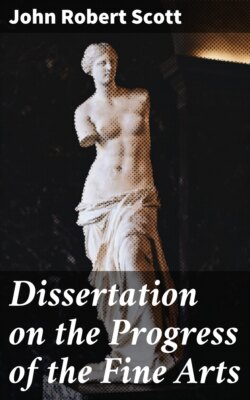Dissertation on the Progress of the Fine Arts

Реклама. ООО «ЛитРес», ИНН: 7719571260.
Оглавление
John Robert Scott. Dissertation on the Progress of the Fine Arts
Dissertation on the Progress of the Fine Arts
Table of Contents
INTRODUCTION
Footnote
CONTENTS
PREFACE
A DISSERTATION, &c
Отрывок из книги
John Robert Scott
Published by Good Press, 2021
.....
But still the greatness of the art which they did not have moved and attracted them. Their work is perhaps a measure of their attempts to rationalize out of existence a longing for the art which they felt their time was not giving them. Perhaps that is why Scott, in the 1790's—his mind, so it seems to us, not only informed but made by the critical formulae of his time—tried to face squarely up to the fact that somehow greet art had to be made possible for even his enlightened century. Yet his mind was so simple and simplifying that he thought that merely by denying his predecessors carefully worked out conjecture of the necessary connection between an "early" society and great art, he could prove that such was possible in his time. For the artist envisaged in the "Dissertation" is still, in spite of his obvious attempts to have it otherwise, the artist as conceived of by Blackwell and the rest of Scott's predecessors. Scott glories in the civilized achievements of his own age, yet somehow hopes that the same "liberal public encouragement" that obtained in Greece will come again and make for such labor, pains, and study as will create in England art as great as Greece's. Such a condition, he feels, is not impossible; yet he says nothing of the kind of social structure and character which he has already shown to be requisite to the development of "liberal public encouragement." The argument, such as it is, is left hanging. That is to say, there is no evidence in the essay that Scott could really think through to the possibility of the major artist's being immediately present in an eighteenth-century society re-made, so far as its artistic life was concerned, in a primitivistic pattern. He remains purely a theoretical possibility in Scott's scheme of things, as does the society in which he might flourish.
Likewise, in the other essays [3] which Scott collected and published along with the "Dissertation," there is no evidence that he really understood what was involved in taking the stand he did. In the most interesting of these pieces, "An Essay on the Influence of Taste on Morals," he denies the existence of a Hutchesonian moral sense, absolutely separates esthetic taste from morals, holds that art will have an influence toward immorality unless it is kept in check with a moral system properly inculcated by revealed religion. What he is entirely unaware of is the possible radical implications of such a separation of art and morality. As in the "Dissertation," he accepts a conventional notion and is satisfied to push it as far as he can, never exploring its possible ambiguities.
.....